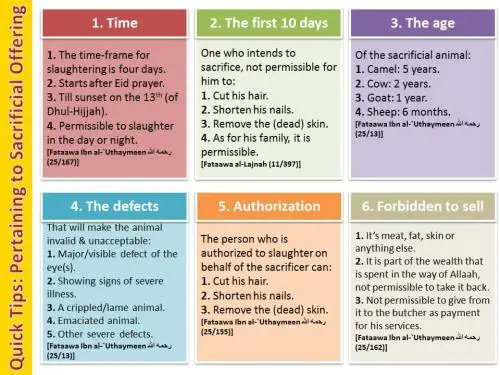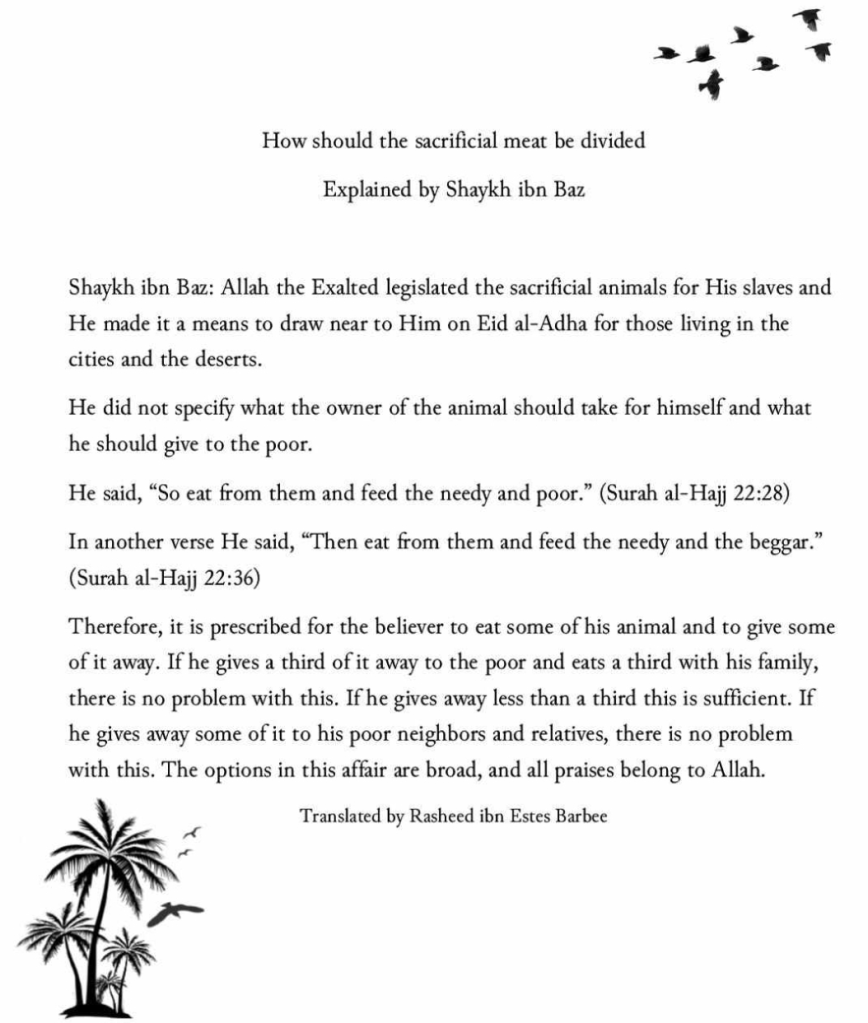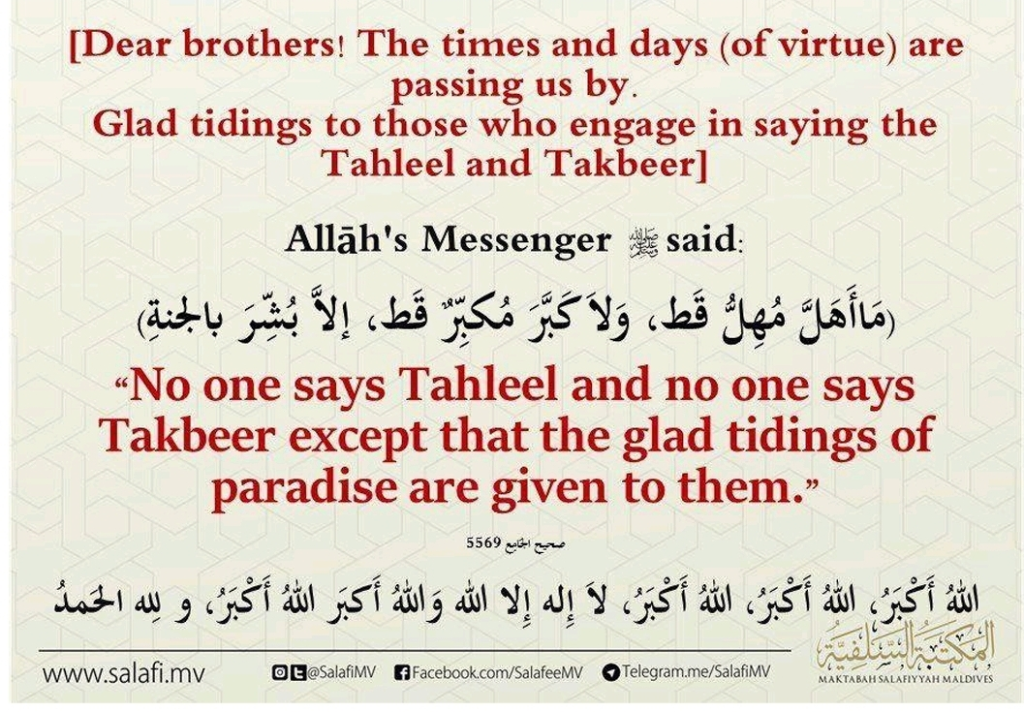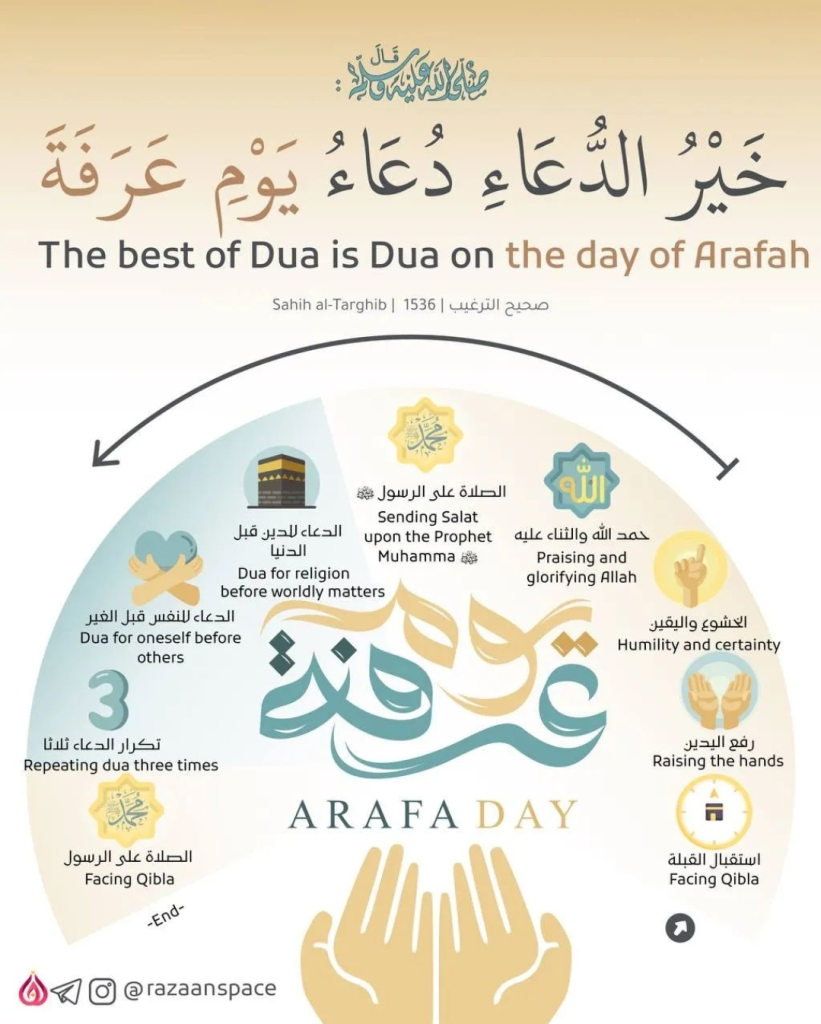
Archive for June 15th, 2024
Quick Tips: Pertaining to Sacrificial Offering
Posted in Uncategorized on June 15, 2024| Leave a Comment »
How is the Udhiyah divided and distributed?
Posted in Uncategorized on June 15, 2024| Leave a Comment »
Question: May Allah treat you well noble parent, the questioner says, how is the Udhiyah divided and distributed?
Answer: In thirds, the Sunnah is to divide it into thirds. You eat one third, you give one third in charity, and you give one third as a gift. This is the Sunnah
Source: http://www.alfawzan.af.org.sa/ar/node/2715
Translated by Rasheed ibn Estes Barbee
QUESTION: What is the ruling on the Udhiyah Sacrifice, and what is more virtuous – that it be distributed as raw meat or as cooked food? As there are some people who say that the third which is given as charity is not allowed to be cooked nor have its bones cut?
Posted in Uncategorized, tagged fatwa on June 15, 2024| Leave a Comment »
QUESTION: What is the ruling on the Udhiyah Sacrifice, and what is more virtuous – that it be distributed as raw meat or as cooked food? As there are some people who say that the third which is given as charity is not allowed to be cooked nor have its bones cut?
ANSWER by the Permanent Committee for Religious Verdicts, headed by Shaykh Ibn Baaz (may Allah have Mercy on him):
الأضحية سنة كفاية، وقال بعض أهل العلم: هي فرض عين، والأمر في توزيعها مطبوخة أو غير مطبوخة واسع، وإنما المشروع فيها أن يأكل منها، ويهدي، ويتصدق.
The Udhiyah_ Sacrifice is a Sunnah Kifaayah [1], and some scholars have said it is an obligation on everyone individually. The manner of distributing it, whether cooked or raw, is open [to your discretion]. However, what is specifically legislated is that it should be eaten from, given as gifts, and given in charity. [2]
وبالله التوفيق وصلى الله على نبينا محمد وآله وصحبه وسلم.
And through Allah Alone is all success. May Allah raise the rank of our Prophet Muhammad, and that of his family and companions, and may He grant them all peace.[3]
SOURCE: Fataawaa al-Lajnat ad-Daa’imah, (11/394 of the first compilation), translated by Moosaa Richardson.
For more details:
Should the Meat of the Udhiyah Sacrifice be Distributed as Cooked Food or Raw Meat?
How should the sacrificial meat be divided- Explained by Shaikh Ibn Baz
Posted in Uncategorized on June 15, 2024| Leave a Comment »
“No one says Tahleel and no one says Takbeer except…”
Posted in Dhikr, Dhul Hijjah, Sunnah, tagged dhikr, dhul-hijjah, dhulhijjah, Hadeeth, hadith, muslim, Quran, Sunnah on June 15, 2024| Leave a Comment »
Dua on the day of Arafah
Posted in Uncategorized on June 15, 2024| Leave a Comment »
The Hajj and ʿUmrah Book PDF
Posted in Uncategorized on June 15, 2024| Leave a Comment »
“The Best Du’aa, is the Du’aa of ‘Arafah.”
Posted in Uncategorized, tagged Allah, Arafah, Du'a, hadith, Islam, Quran, Sunnah on June 15, 2024| Leave a Comment »

Al-Allaamah Shaykh Saalih al-Fawzaan (may Allaah preserve him) stated:
“Likewise (from the beneficial matters of Hajj) is the Du’aa of ‘Arafah.
The Prophet (sallallaahu alayhi wa sallam) mentioned:
“The best Du’aa, is the Du’aa of ‘Arafah. The best of that which myself and the Prophets before me have said is: –
Laa Ilaaha Illallaah Wahdahu Laa Shareeka Lahu, Lahul Mulk Wa Lahul Hamd Wa Huwa Alaa Kulli Shay In Qadeer
– None has the right to be worshiped except Allaah, who is alone without partners. For Him is the dominion and the praise. He is capable of doing all things.”
(Musnad of Ahmad and Sunan of At-Tirmidhee Declared good by Shaykh Al-Albaani)
This is the best of that which the Prophet (sallallaahu alayhi wa sallam) said and He named it the Du’aa of ‘Arafah. That is because the Du’aa is of two types:
1. Du’aa of worship. The statement ((Laa Ilaaha Illallaah)) is the Du’aa of worship and praise for Allaah. All of this is the Du’aa of worship.
2. Du’aa of request. It is that you ask Allaah to forgive you, to have mercy upon you, or that you ask that He provides for you, guides you, make you firmly established (upon the religion of Islaam), forgive your parents, forgive your children and forgive your brothers… This is the Du’aa of request and it is that you ask Allaah (for that which you are seeking).
The example of this is the statement of Allaah:
“You (Allaah) alone we worship and You (Allaah) alone we seek for help”
(Faatihah: 5)
So the statement “You (Allaah) alone we worship” this is the Du’aa of worship. The statement “You (Allaah) alone we seek for help”, this is the Du’aa of request. Therefore, we have in one verse the Du’aa of worship and the Du’aa of request.”
Source: Aqeedatul-Hajj Fee Daw al-Kitaab wa as-Sunnah pgs. 12-13 by Al-Allaamah Shaykh Saalih Al-Fawzaan (may Allaah preserve him)
Sisters Upon Al-Istiqaamah
Hadeeth on Yawmul Arafah…
Posted in Uncategorized on June 15, 2024| Leave a Comment »
Ibn Rajab’s Advice To Those Unable To Perform The Hajj
Posted in Uncategorized, tagged Arafah, dhul-hijjah, hajj, Islam, kabah on June 15, 2024| Leave a Comment »

Ibn Rajab (rahimahullaah) said in Lataa-if (p.385):
“Whoever missed out on the standing at ‘Arafah; then let him stand for Allaah in regards to His rights in that which he is aware of.
Whoever was incapable from residing the night at Muzdalifah; then let his determination reside the nights upon obedience to Allaah – and indeed he will come close to Him and draw near to Him.
Whoever it was not possible for to stand in the vicinity of (Masjid) Al-Khaif (at Mina); then let him stand for Allaah with the right of hope and fear.
Whoever was unable to slaughter his sacrificial offering at Mina; then let him slaughter his desire right here – and indeed he would have attained the endurance of adversity.
Whoever was unable to reach the House (the Ka’bah) because he was far from it; then let him aspire to The Lord of the House, for indeed He is closer to the one who supplicates to Him and has hope in Him – than his jugular vein [4].”
________________________________________
[4] As He, The Most High states:
((And indeed We have created man, and We know what his soul whispers to him, and We are closer to him than his jugular vein)) (Qaaf: 16).
Excerpt from the article. Translated by Abu Haatim M. Farooq




